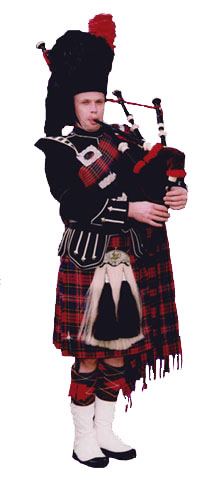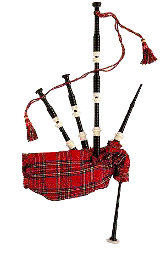

Events
History
 |
 |
||||||
| Home | About Bryce | Suggested Events |
Bagpipe History |
References | Links | ||
ancient history | modern history | sovereign pipers | Scottish small pipes | lowland music
Sovereign Pipers
Courtesy of Ronald Morrison
One of the duties of the sovereign's piper who resides at Buckingham Palace is to play every morning. Monday to Friday, from 09.00am - 10.00am, this a duty which many Londoners and tourists alike will be completely aware.
The history of the piper to sovereign goes back to the start of queen Victoria's reign in 1837. Queen Victoria and Albert paid a visit to the highlands in 1842, where they stayed in Taymouth Castle with the Marquis of Breadalbane. The queen was so taken with the ceremony provided at the castle that she wrote to her mother, the Duchess of Kent: "We have heard nothing but bagpipes since we have been to the beautiful Highlands and I have become so fond of it that I mean to have a piper". She sought the advice of the Marquis of Breadalbane and he recommended that the famous Angus MacKay be appointed to the post with the result that Angus was admitted by the Clerk Marshal as first piper to her Majesty on July 25th 1843.
Of course there was some other influence afoot for the appointment, the Queen's father, the Duke of Kent, and her uncle, the Duke of Sussex, had each employed a piper at Kensington Castle, although it would be seem strange that any of Queen Victoria's predecessors would employ a Highland Piper having regard to the conflict which existed between the Hanoverians and the Jacobites. The Proscription Act of 1746, approved by George II, made it a felony to wear the Highland Garb; there is evidence of one execution of a piper, one James Reid, who was garrisoned in Carlisle when he surrendered to the army of the notorious Cumberland in 1746. He pleaded that he was a piper but in the eyes of the law the bagpipe was classified as an instrument of war, consequently he was condemned and executed.
The destruction created by the army of occupation left the Jacobite Clans in disarray, demoralised and without leadership for a generation. But a change was on the way. In 1778 the renowned London Highland Society was formed and it campaigned vigorously for the repel of the Act and achieved its objective in 1782 when the Act was repealed.
After the death of Prince Charles Edward in 1788, attitudes began to change, there was no longer a direct threat to the succession, several royal princes became members of Highland society, Highland customs and culture once again became fashionable. George IV visited Edinburgh in 1822 when he wore an elaborate form of Highland dress amid a display of colourful tartans and distinct Highland dress and music from its renowned place in the clan system to a hitherto unknown symbol of romantic national feeling. We must never forget that Queen Victoria was familiar with piping from her early days at Kensington Palace, her father and uncle each had a piper. Donald MacKay, brother to the famous Angus, was a piper to the Duke of Sussex while John McGregor, nephew to the John McGregor who was piper to Prince Charles Edward in 1745, was piper to the Duke of Kent. There is no doubt that the Queen enjoyed the sound of the bagpipe and her appointment of Angus MacKay had wide reaching significance in the advancement and development of the music of the Highland Bagpipe.
Angus MacKay was a son of the famous John MacKay who was piper to Macleod of Raasay for many years. Angus at the early age of 13 was awarded a prize by the Highland Society in response to their appeal for pipe music to be produced in scientific form. Given the support of the Highland Society he published a collection of pibrochs in 1838, complete with historical notes which more or less has become an essential for the present day professionals. He came to London at the age of 30 with an established background which commanded the highest respect. Regretfully, Angus MacKays services to the sovereign came to an end in 1854 due to mental illness. He was granted a royal pension and after a period in Bethlehem Hospital he was transferred to the Crichton Mental hospital in Dumfries, he was drowned in the river Nith while trying to escape, he was 46 years of age.
Angus MacKay's contribution to the classical music of the great Highland bagpipe was considerable, together with his development of marches, Strathspeys and reels, he revised "The Tutor for the Highland Bagpipe" by William MacKay, which contained one hundred examples of marches, Strathspeys, reels and jigs. He was Succeeded by Pipe Major William Ross in 1854, William Ross came from the Royal Highland Regiment, The Black Watch, where he had served for 14 years and from that date the office of piper to the sovereign continues to the present time.
It is evident the Queen Victoria's patronage played a prominent role in popularising the music of the Highland bagpipe and this support was maintained by Edward VII on his becoming Monarch in 1901 when he retained the services of James Campbell who was piper to Queen Victoria.
When George V ascended the throne in 1910, he appointed Henry Forsyth who had previously retired from the Scots Guards. George V was particularly interested in the advancement of piping, this is evident when he sent Robert Brown and Robert Nicol - both employees on the Balmoral Estate to Pipe Major John MacDonald, Inverness, who was regarded as the greatest of all pipers, for advanced instruction during the winter.
In 1965, it was decided to remove the post from the Queen's List so that future appointments be made from the experienced Army Majors. The first posting was Andrew Pitkeathley of the Argyll and Sutherland Highlanders who had won the Gold Medal at Inverness in 1949 and held the rank of Pipe Major and Warrant Officer class 1. Since the Second World War the rank of Pipe Major in the army allows progression to Warrant Officer and anyone seconded to the Palace would need to be of that rank and his duties would be equal to his status.
In conclusion it is very clear that Royal patronage conferred a distinct respectability on the prestige of the great Highland bagpipe in Scotland.

BRYCE McCULLOCH
Tel +44 1655 882101
Mobile +44 7974 838742
BAGPIPES | HOME | LINKS | SOLO PIPER
GERMAN | ITALIAN | SPANISH | ENGLISH
Visitor Number